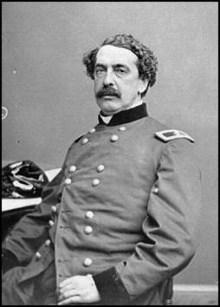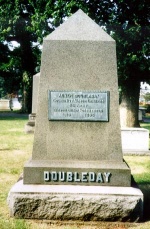Abner Doubleday: Difference between revisions
No edit summary |
No edit summary |
||
| Line 4: | Line 4: | ||
[[Category:Writers|Doubleday, Abner]] | [[Category:Writers|Doubleday, Abner]] | ||
[[Category:Nationality American|Doubleday, Abner]] | [[Category:Nationality American|Doubleday, Abner]] | ||
[[File:Abner Doubleday.jpg| | [[File:Abner Doubleday.jpg|220px|right|thumb|General Abner Doubleday]] | ||
'''Abner Doubleday''' was an American general who was an important member of the [[Theosophical Society]] in its earliest years. | '''Abner Doubleday''' was an American general who was an important member of the [[Theosophical Society]] in its earliest years. | ||
| Line 33: | Line 33: | ||
Doubleday wrote several books and reports about the Civil War | Doubleday wrote several books and reports about the Civil War | ||
''Celebration of the National Anniversary by Doubleday's Brigade: at Camp Opposite Fredericksburg, Virginia, July 4th, 1862''. Philadelphia: Crissy & Markley, 1862. Written with George F. Noyes. | * '''''Celebration of the National Anniversary by Doubleday's Brigade: at Camp Opposite Fredericksburg, Virginia, July 4th, 1862'''''. Philadelphia: Crissy & Markley, 1862. Written with George F. Noyes. | ||
''Chancellorsville and Gettysburg: an eyewitness account of the pivotal battles of the Civil War''. New York: Charles Scribner's Sons, 1882. New edition: St. Petersburg, FL: Red and Black Publishers, 2009. Also published as Volume 6 of ''Campaigns of the Civil War''. Harrisburg, PA: Archive Society, 1992. | * '''''Chancellorsville and Gettysburg: an eyewitness account of the pivotal battles of the Civil War'''''. New York: Charles Scribner's Sons, 1882. New edition: St. Petersburg, FL: Red and Black Publishers, 2009. Also published as Volume 6 of ''Campaigns of the Civil War''. Harrisburg, PA: Archive Society, 1992. | ||
''Gettysburg made plain: a succinct account of the campaign and battles, with the aid of one diagram and twenty-nine maps''. New York: Century Co., 1888. Four editions through 1909. | * '''''Gettysburg made plain: a succinct account of the campaign and battles, with the aid of one diagram and twenty-nine maps'''''. New York: Century Co., 1888. Four editions through 1909. | ||
''Meade at Gettysburg: his proposed retreat on the night of the 2nd of July, Gen. Doubleday's defense of his statement that Meade was overruled by the action of a council of war''. [New York : New York Times?], 1883. | * '''''Meade at Gettysburg: his proposed retreat on the night of the 2nd of July, Gen. Doubleday's defense of his statement that Meade was overruled by the action of a council of war'''''. [New York : New York Times?], 1883. | ||
''My life in the Old Army: the Reminiscences of Abner Doubleday: from the Collections of the New-York Historical Society''. Ft. Worth: TX Christian University Press, 1998. ISBN 0-87565-185-2. Several previous editions. | * '''''My life in the Old Army: the Reminiscences of Abner Doubleday: from the Collections of the New-York Historical Society'''''. Ft. Worth: TX Christian University Press, 1998. ISBN 0-87565-185-2. Several previous editions. | ||
''Reminiscences of Forts Sumter and Moultrie in 1860-'61''. New York: Harper & Brothers, 1876. Thirty-one editions 1876-2000. | * '''''Reminiscences of Forts Sumter and Moultrie in 1860-'61'''''. New York: Harper & Brothers, 1876. Thirty-one editions 1876-2000. | ||
''Reports of the Battles of Gettysburgh: July 1st, 2d and 3d, 1863''. Montpelier: Walton's Steam Press, 1865. | * '''''Reports of the Battles of Gettysburgh: July 1st, 2d and 3d, 1863'''''. Montpelier: Walton's Steam Press, 1865. | ||
<br> | <br> | ||
[[File:Doubleday marker.jpg|150px|right]] | [[File:Doubleday marker.jpg|150px|right]] | ||
| Line 54: | Line 54: | ||
<br> | <br> | ||
<br> | <br> | ||
== Honors and memorials == | == Honors and memorials == | ||
| Line 61: | Line 60: | ||
In World War II, a liberty ship was named after him.<ref>"SS Abner Doubleday," Wikipedia, accessed February 17, 2012. [http://en.wikipedia.org/wiki/SS_Abner_Doubleday]</ref> | In World War II, a liberty ship was named after him.<ref>"SS Abner Doubleday," Wikipedia, accessed February 17, 2012. [http://en.wikipedia.org/wiki/SS_Abner_Doubleday]</ref> | ||
== Additional resources == | |||
*[http://www.theosophy-nw.org/theosnw/theos/th-tsgom.htm# Abner Doubleday and Theosophy in America: 1879-1884] by Michael Gomes | |||
== Notes == | == Notes == | ||
<references/> | <references/> | ||
Revision as of 22:25, 30 January 2014
Abner Doubleday was an American general who was an important member of the Theosophical Society in its earliest years.
Early life
Doubleday was born in a one-room house in Ballston Spa, New York, on June 26, 1819. After attending a private preparatory school in Cooperstown, New York, the young man worked for two years as a surveyor and civil engineer. His father and both grandfathers were all army veterans, and Doubleday obtained an appointment to the United States Military Academy at West Point. More detail is available in a well-documented article in Wikipedia.[1]
Military career
After graduating from West Point in 1942, the young Doubleday served in the Mexican-American War and the Seminole wars. In this period he married Mary Hewitt of Baltimore. As a Captain and second in command at Fort Sumter, he participated in the firing of the first cannon, the shot that started the American Civil War on April 12, 1861. He commanded artillery in the Army of the Potomac, seeing action at the Northern Virgina Campaign, the Second Battle of Bull Run, South Mountain, Antietum, and, most notably, Gettysburg. His rise through the ranks was rapid, and he became a major general in March, 1963. He was wounded more than once. Late in the war he mostly held administrative positions in Washington, overseeing courts martial and the defenses of the District of Columbia.
Due to his significant role in the war, General Doubleday rode on the train with President Lincoln to Gettysburg when the Gettysburg Address was delivered.
Theosophical work
General Doubleday was a significant leader in the early history of the Theosophical Society. After joining on June 30, 1878, he became Vice President of the TS from 1880-1888. For a brief period beginning January 17, 1879, he served as interim President, after Henry Steel Olcott, the President-Founder, moved to India. He was held in very high regard by Colonel Olcott, but received very little direction in how to carry out his new responsibilities, as documented by historian Michael Gomes. The energy of the American society was diminished by departure of the founders, and hampered by the fact that Olcott had taken the membership list away with him. [2]
Doubleday joined the American Board of Control on May 13, 1884. When the American Section was formed in 1886, in Cincinnati, he was a charter member.[3]
Connection to baseball
In the United States, General Doubleday is widely called the "father of baseball," and in 1939 he was celebrated in a centenary at Cooperstown, New York, home of the Baseball Hall of Fame. Cooperstown is supposedly the location where Doubleday introduced the game at Doubleday Field. In fact, Doubleday never claimed to have any particular association with the game. Linking the well-known General to the foundation of the American national past-time seems to have been a publicity stunt by sporting goods manufacturer Albert Spalding. For more complete coverage of this topic, see the "Origins of baseball" in Wikipedia, where a section is devoted to the "Abner Doubleday myth."[4]
Writings
Doubleday wrote several books and reports about the Civil War
- Celebration of the National Anniversary by Doubleday's Brigade: at Camp Opposite Fredericksburg, Virginia, July 4th, 1862. Philadelphia: Crissy & Markley, 1862. Written with George F. Noyes.
- Chancellorsville and Gettysburg: an eyewitness account of the pivotal battles of the Civil War. New York: Charles Scribner's Sons, 1882. New edition: St. Petersburg, FL: Red and Black Publishers, 2009. Also published as Volume 6 of Campaigns of the Civil War. Harrisburg, PA: Archive Society, 1992.
- Gettysburg made plain: a succinct account of the campaign and battles, with the aid of one diagram and twenty-nine maps. New York: Century Co., 1888. Four editions through 1909.
- Meade at Gettysburg: his proposed retreat on the night of the 2nd of July, Gen. Doubleday's defense of his statement that Meade was overruled by the action of a council of war. [New York : New York Times?], 1883.
- My life in the Old Army: the Reminiscences of Abner Doubleday: from the Collections of the New-York Historical Society. Ft. Worth: TX Christian University Press, 1998. ISBN 0-87565-185-2. Several previous editions.
- Reminiscences of Forts Sumter and Moultrie in 1860-'61. New York: Harper & Brothers, 1876. Thirty-one editions 1876-2000.
- Reports of the Battles of Gettysburgh: July 1st, 2d and 3d, 1863. Montpelier: Walton's Steam Press, 1865.
Later years
The general died on January 26, 1893.
Honors and memorials
A monument to Doubleday was erected at Gettysburg by his men, admirers, with support from the state of New York.[5] At the site of his burial in Arlington National Cemetery, there is a 7-foot (2.1 m) obelisk monument, pictured at right.
In World War II, a liberty ship was named after him.[6]
Additional resources
- Abner Doubleday and Theosophy in America: 1879-1884 by Michael Gomes
Notes
- ↑ "Abner Doubleday," Wikipedia, accessed February 17, 2012.[1].
- ↑ Michael Gomes, "Abner Doubleday and Theosophy in America: 1879-1884," Sunrise (April/May 1991), available at [2]
- ↑ The International Theosophical Year Book 1938 (Adyar, Madras, India: Theosophical Publishing House, 1938): 178.
- ↑ "Origins of baseball," Wikipedia, accessed February 17, 2012.[3]
- ↑ Gettysburg Website, accessed February 17, 2012.[4]
- ↑ "SS Abner Doubleday," Wikipedia, accessed February 17, 2012. [5]

